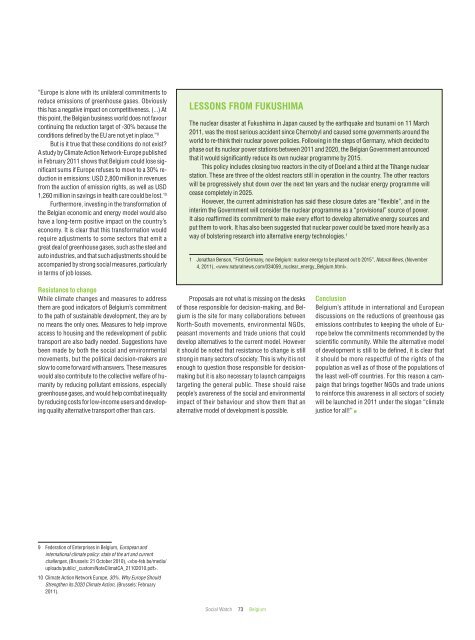burden of deforestation, desertification, erosion of ... - Social Watch
burden of deforestation, desertification, erosion of ... - Social Watch
burden of deforestation, desertification, erosion of ... - Social Watch
You also want an ePaper? Increase the reach of your titles
YUMPU automatically turns print PDFs into web optimized ePapers that Google loves.
“Europe is alone with its unilateral commitments to<br />
reduce emissions <strong>of</strong> greenhouse gases. Obviously<br />
this has a negative impact on competitiveness. (...) At<br />
this point, the Belgian business world does not favour<br />
continuing the reduction target <strong>of</strong> -30% because the<br />
conditions defined by the EU are not yet in place.” 9<br />
But is it true that these conditions do not exist?<br />
A study by Climate Action Network-Europe published<br />
in February 2011 shows that Belgium could lose significant<br />
sums if Europe refuses to move to a 30% reduction<br />
in emissions: USD 2,800 million in revenues<br />
from the auction <strong>of</strong> emission rights, as well as USD<br />
1,260 million in savings in health care could be lost. 10<br />
Furthermore, investing in the transformation <strong>of</strong><br />
the Belgian economic and energy model would also<br />
have a long-term positive impact on the country’s<br />
economy. It is clear that this transformation would<br />
require adjustments to some sectors that emit a<br />
great deal <strong>of</strong> greenhouse gases, such as the steel and<br />
auto industries, and that such adjustments should be<br />
accompanied by strong social measures, particularly<br />
in terms <strong>of</strong> job losses.<br />
Resistance to change<br />
While climate changes and measures to address<br />
them are good indicators <strong>of</strong> Belgium’s commitment<br />
to the path <strong>of</strong> sustainable development, they are by<br />
no means the only ones. Measures to help improve<br />
access to housing and the redevelopment <strong>of</strong> public<br />
transport are also badly needed. Suggestions have<br />
been made by both the social and environmental<br />
movements, but the political decision-makers are<br />
slow to come forward with answers. These measures<br />
would also contribute to the collective welfare <strong>of</strong> humanity<br />
by reducing pollutant emissions, especially<br />
greenhouse gases, and would help combat inequality<br />
by reducing costs for low-income users and developing<br />
quality alternative transport other than cars.<br />
9 Federation <strong>of</strong> Enterprises in Belgium, European and<br />
international climate policy: state <strong>of</strong> the art and current<br />
challenges, (Brussels: 21 October 2010), .<br />
10 Climate Action Network Europe, 30%. Why Europe Should<br />
Strengthen its 2020 Climate Action, (Brussels: February<br />
2011).<br />
LESSONS FROM FUKUSHIMA<br />
The nuclear disaster at Fukushima in Japan caused by the earthquake and tsunami on 11 March<br />
2011, was the most serious accident since Chernobyl and caused some governments around the<br />
world to re-think their nuclear power policies. Following in the steps <strong>of</strong> Germany, which decided to<br />
phase out its nuclear power stations between 2011 and 2020, the Belgian Government announced<br />
that it would significantly reduce its own nuclear programme by 2015.<br />
This policy includes closing two reactors in the city <strong>of</strong> Doel and a third at the Tihange nuclear<br />
station. These are three <strong>of</strong> the oldest reactors still in operation in the country. The other reactors<br />
will be progressively shut down over the next ten years and the nuclear energy programme will<br />
cease completely in 2025.<br />
However, the current administration has said these closure dates are “flexible”, and in the<br />
interim the Government will consider the nuclear programme as a “provisional” source <strong>of</strong> power.<br />
It also reaffirmed its commitment to make every effort to develop alternative energy sources and<br />
put them to work. It has also been suggested that nuclear power could be taxed more heavily as a<br />
way <strong>of</strong> bolstering research into alternative energy technologies. 1<br />
1 Jonathan Benson, “First Germany, now Belgium: nuclear energy to be phased out b 2015”, Natural News, (November<br />
4, 2011), .<br />
Proposals are not what is missing on the desks<br />
<strong>of</strong> those responsible for decision-making, and Belgium<br />
is the site for many collaborations between<br />
North-South movements, environmental NGOs,<br />
peasant movements and trade unions that could<br />
develop alternatives to the current model. However<br />
it should be noted that resistance to change is still<br />
strong in many sectors <strong>of</strong> society. This is why it is not<br />
enough to question those responsible for decisionmaking<br />
but it is also necessary to launch campaigns<br />
targeting the general public. These should raise<br />
people’s awareness <strong>of</strong> the social and environmental<br />
impact <strong>of</strong> their behaviour and show them that an<br />
alternative model <strong>of</strong> development is possible.<br />
<strong>Social</strong> <strong>Watch</strong> 73 Belgium<br />
Conclusion<br />
Belgium’s attitude in international and European<br />
discussions on the reductions <strong>of</strong> greenhouse gas<br />
emissions contributes to keeping the whole <strong>of</strong> Europe<br />
below the commitments recommended by the<br />
scientific community. While the alternative model<br />
<strong>of</strong> development is still to be defined, it is clear that<br />
it should be more respectful <strong>of</strong> the rights <strong>of</strong> the<br />
population as well as <strong>of</strong> those <strong>of</strong> the populations <strong>of</strong><br />
the least well-<strong>of</strong>f countries. For this reason a campaign<br />
that brings together NGOs and trade unions<br />
to reinforce this awareness in all sectors <strong>of</strong> society<br />
will be launched in 2011 under the slogan “climate<br />
justice for all!” n

















